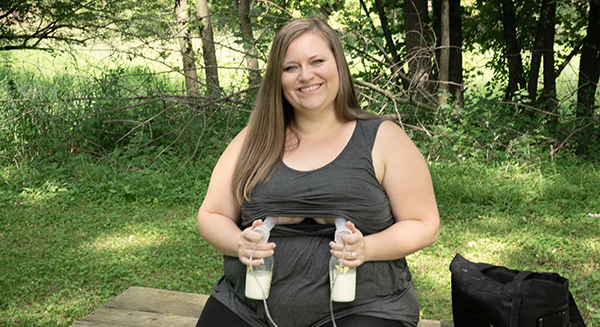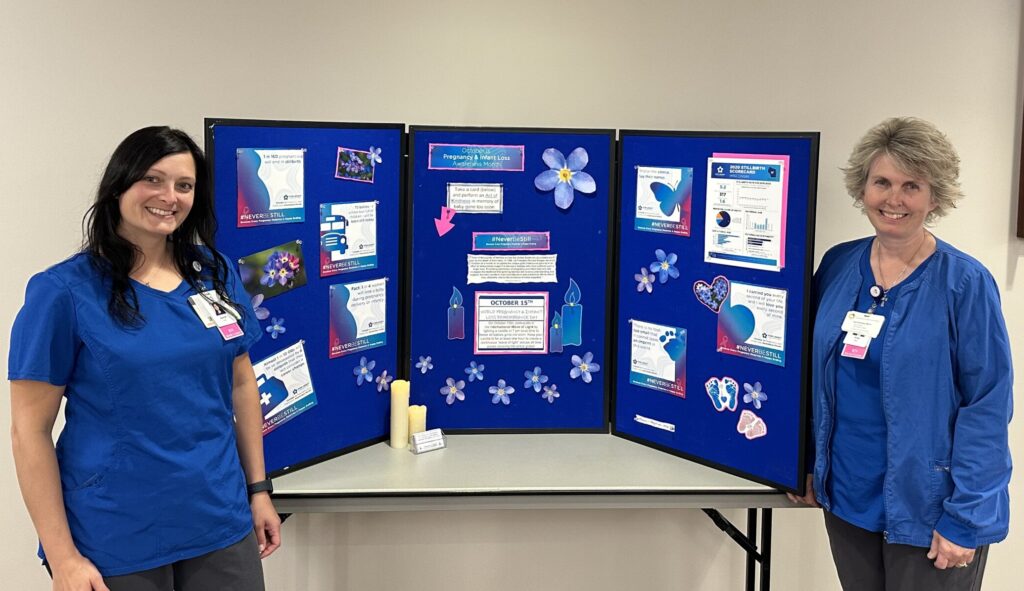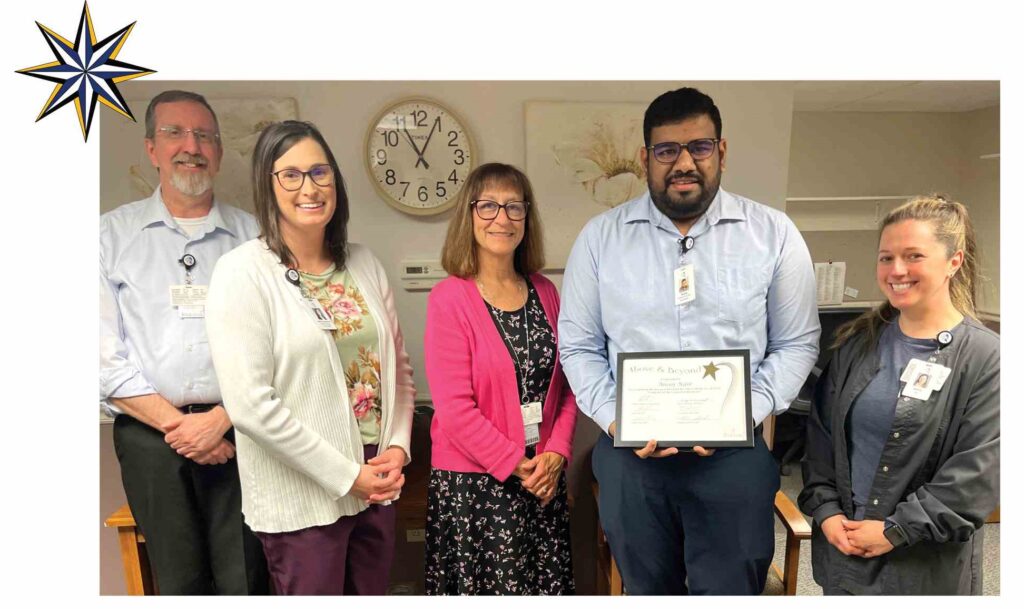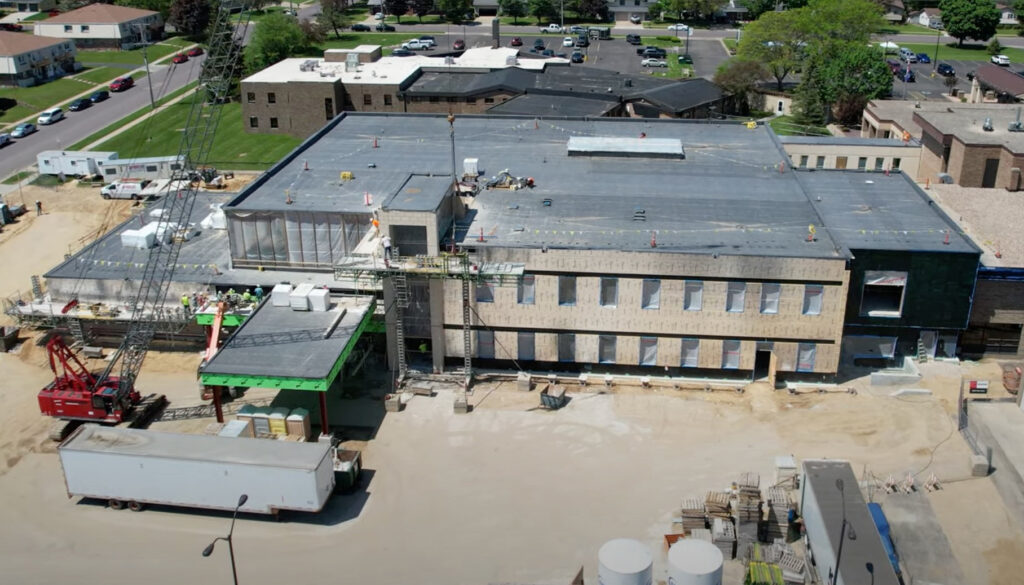Lactation / Breastfeeding Support


At RAMC’s Birth Center, breastfeeding is a powerful way for mothers to bond with their babies and promote their health. Our team of experts is dedicated to helping mothers learn about the benefits of breastfeeding and providing them with the support they need to make the most of this particular time. We understand that every mother’s breastfeeding journey is unique, and we’re here to help you every step of the way. Our nurses have special training to help you start breastfeeding and make it a positive experience. We want to be your partner in motherhood, celebrating the joys of this particular time with you.
Meet Our Breastfeeding Experts
In addition to our highly skilled nursing team, we are proud to have several International Board Certified Lactation Consultants (IBCLCs) and Certified Lactation Counselors (CLCs) as a part of our staff. They are skilled in supporting breastfeeding mothers in all situations. From essential guidance on breastfeeding practices to managing more complex challenges, our professionals are on hand to make your breastfeeding journey as smooth and rewarding as possible.
RAMC's International Board Certified Lactation Consultants

Amy Romberg, RN, IBCLC

Megan Haas, RN, IBCLC

Jessica Ritchert, RN, IBCLC

Callissa Moll, RN, IBCLC
Ongoing Lactation Support
Our commitment reaches beyond your stay at our center. After discharge, our breastfeeding specialists will continue to provide you with the highest quality assistance. We are all ears for any questions and are dedicated to offering the best advice, ensuring you’re confident and comfortable breastfeeding even after bringing your baby home.
- International Board Certified Lactation Consultant
- Health care professionals who focus on the clinical management of breastfeeding
- Certified by the International Board of Lactation Consultant Examiners (IBLCE)
- Have the highest level credential, requiring university-level coursework, hundreds of hours of clinical experience, and a rigorous board exam
- Can help with everyday breastfeeding questions and more complex issues
- International Board Certified Lactation Consultant
- Health care professionals who focus on the clinical management of breastfeeding
- Certified by the International Board of Lactation Consultant Examiners (IBLCE)
- Have the highest level credential, requiring university-level coursework, hundreds of hours of clinical experience, and a rigorous board exam
- Can help with everyday breastfeeding questions and more complex issues
- Identify your support network. Think about who will help you, provide positive input, and cheer you on!
- Read up – we like kellymom.com.
- Take a class – call the RAMC Birth Center for more information.
- Talk by phone with one of our IBCLCs or set up a time to meet in person.
- Check out a breastfeeding group such as La Leche League.
- Keep all appointments with your providers, and ask questions.
Breastfeeding support is a priority for us at RAMC Birth Center. During your hospital stay our experienced nurses will be there to assist you and your baby with feeding. Our nurses have additional breastfeeding training and/or certifications including:
- EMPower Training
- Certified Lactation Counselor (CLC)
- International Board Certified Lactation Consultant (IBCLC)
An initial breastfeeding support visit is scheduled with us in the Birth Center within a few days of discharge after delivery. Parents find this first visit back very helpful. It includes:
- Weight check for baby
- Check baby for jaundice
- Breastfeeding support
- Postpartum depression screening
- Answering any questions or concerns
During your breastfeeding journey, you may have questions or need assistance. Lactation support is always available by phone or appointment, no matter the age of your breastfeeding child.
We also provide resources and help answer questions about managing supply (low supply or oversupply, for example), engorgement, plugged ducts, mastitis, illness and breastfeeding, pumping, managing breastfeeding at work, nipple/breast pain, and more!
For immediate assistance, call the RAMC Birth Center at 608-768-6251
To leave a non-urgent message, call our Lactation office at 608-768-6135
We’re here to answer your back to work questions.
• Do you wonder how often you will need to pump throughout your work day?
• What kind of space do you need to successfully pump?
• How can I best help my baby through this transition?
We can help you navigate your back to work journey. Call us to talk through your concerns and make a plan.
Online resources
• World Breastfeeding Week is celebrated yearly August 1-7.
• It takes energy to make milk and your body burns calories doing it – sometimes as much as 300-500 calories per day.
• Newborns have a well-developed sense of smell. They know their mom’s breast milk scent!
• Colostrum is produced the first few days after birth. It is nutrient-rich, filled with protein, minerals, calcium and antibodies. Fattier milk comes in after the colostrum, allowing infants to slowly adapt to taking in a higher volume of milk and gain weight.
• Breast milk contains more seratonin (a hormone that helps babies sleep) toward the end of the day.
• Parents who breastfeed are less likely to experience post-partum depression.
 We know that human breast milk is the best source of nutrition for human babies. RAMC is happy to be able to offer donor milk to infants in certain situations where mom may not be able to express her own milk immediately. Milk donors are healthy moms who choose to give their extra milk to other mothers who may need it for their infants. Milk donors have special directions for collecting, storing, and sending their milk to the milk bank and are screened with written and verbal communication, as well as blood testing, which includes HIV testing.
We know that human breast milk is the best source of nutrition for human babies. RAMC is happy to be able to offer donor milk to infants in certain situations where mom may not be able to express her own milk immediately. Milk donors are healthy moms who choose to give their extra milk to other mothers who may need it for their infants. Milk donors have special directions for collecting, storing, and sending their milk to the milk bank and are screened with written and verbal communication, as well as blood testing, which includes HIV testing.
When donor milk is sent to the milk bank, it is heat treated to get rid of viruses and bacteria and is stored in a deep freezer before being distributed to local hospitals. The Mothers’ Milk Bank of the Western Great Lakes follows food-preparing rules from the Food and Drug Administration (FDA). The milk bank also follows guidelines developed by the Human Milk Banking Association of North America (HMBANA). HMBANA regulates non-profit milk banks in the United States and Canada. The donor milk infants receive has been through a lot of testing.
Donor milk helps babies have a healthy balance of bacteria in their stomach and gut. It contains human nutrients for human babies that cannot be found in formula.
Donor milk might be needed if:
• An infant’s blood sugar is low.
• An infant is born prematurely (early) until the infant’s own mother is able to express enough milk for her child.
To ask questions about how RAMC uses donor milk, talk to your provider or call the Birth Center. If you are interested in donating your milk, visit Mothers Milk Bank for more information.
The RAMC Birth Center uses the Ten Steps as a guide to promote successful breastfeeding outcomes and help mothers reach their breastfeeding goals.
From the World Health Organization: “WHO and UNICEF launched the Baby-friendly Hospital Initiative (BFHI) in 1991 to help motivate facilities providing maternity and newborn services worldwide to implement the Ten Steps to Successful Breastfeeding. The Ten Steps summarize a package of policies and procedures that facilities providing maternity and newborn services should implement to support breastfeeding. In 2018, WHO revised the Ten Steps based on the 2017 guideline on protecting, promoting and supporting breastfeeding in facilities that provide maternity and newborn services.
WHO has called upon all facilities providing maternity and newborn services worldwide to implement the Ten Steps. The implementation guidance for BFHI focuses on integrating the programme across healthcare systems to facilitate universal coverage and ensure sustainability over time. The guidance outlines nine key national responsibilities to scale up implementation of the Ten Steps.”
Critical management procedures:
1a. Comply fully with the International Code of Marketing of Breast-milk Substitutes and relevant World Health Assembly resolutions.
1b. Have a written infant feeding policy that is routinely communicated to staff and parents.
1c. Establish ongoing monitoring and data-management systems.
2. Ensure that staff have sufficient knowledge, competence and skills to support breastfeeding.
Key clinical practices:
3. Discuss the importance and management of breastfeeding with pregnant women and their families.
4. Facilitate immediate and uninterrupted skin-to-skin contact and support mothers to initiate breastfeeding as soon as possible after birth.
5. Support mothers to initiate and maintain breastfeeding and manage common difficulties.
6. Do not provide breastfed newborns any food or fluids other than breast milk, unless medically indicated.
7. Enable mothers and their infants to remain together and to practise rooming-in 24 hours a day.
8. Support mothers to recognize and respond to their infants’ cues for feeding.
9. Counsel mothers on the use and risks of feeding bottles, teats and pacifiers.
10. Coordinate discharge so that parents and their infants have timely access to ongoing support and care.
There is substantial evidence that implementing the Ten Steps significantly improves breastfeeding rates. A systematic review of 58 studies on maternity and newborn care published in 2016 demonstrated clearly that adherence to the Ten Steps impacts early initiation of breastfeeding immediately after birth, exclusive breastfeeding and total duration of breastfeeding.
Above information taken from WHO website Nutrition and Food Safety (who.int)
Newborns, from all cultures and countries around the world, instinctively go through 9 Stages in the “Golden Hour” or so after birth as they adjust to life outside the mother’s womb. Skin-to-skin contact with the mother kicks in this process. The RAMC Birth Center promotes allowing time for these 9 instinctive stages to be completed, skin-to-skin, without interruption following birth, giving the mother and infant time to stabilize and connect:
- Stage 1 Birth Cry. Stable infant is placed skin-to-skin.
- Stage 2 Relaxation of infant on mom’s chest.
- Stage 3 Awakening usually begins about 3 min after birth.
- Stage 4 Activity — about 8 min after birth.
- Stage 5 Rest — infant rest times can vary.
- Stage 6 Crawling (moving closer to mom’s nipple) — usually about 35 min after birth.
- Stage 7 Familiarization — usually about 45 min after birth.
- Stage 8 Suckling usually begins 1 hour after birth.
- Stage 9 Sleep — babies usually fall asleep about 1.5-2 hrs after birth.
Source: NIH (National Library of Medicine)
Local Support
The Milk Vine @ RAMC Birth Center (facebook group)
A goal of the MilkVine facebook group is to share information, lift one another up, and provide an opportunities for “mother-to-mother” support. Special events may be planned intermittently throughout the year. Please see the Milk Vine at RAMC Facebook page for more information or to request to be added to this closed group.
Websites
kellymom – Evidence-based information on breastfeeding and parenting
baby gooroo – Focus on health, nutrition, and safety, with an emphasis on breastfeeding. Content is science-based and thoroughly researched.
Videos
Electric Pump and Hands on Pumping
Our Commitment to You
Becoming a mother at Reedsburg Area Medical Center should be a unique and memorable experience. We are committed to providing you with the best possible support and care, particularly regarding breastfeeding. We aim to ensure that every mother feels valued, understood, and cared for throughout her journey. We take great pride in seeing healthy babies and happy, confident mothers. So please join us on this beautiful journey of motherhood, and let us help you provide your newborn with the best care, health, and love possible.

Reach Out to Us
Breastfeeding can be daunting, and uncertainties are natural. Whether you still need to figure out breastfeeding or need to discuss more about it before your delivery, we are just a call away. Let us share resources, clear your doubts, and help you make well-informed decisions. Contact breastfeeding specialists at 608-768-6135 or to reach someone immediately contact our Birth Center 608- 768-6251.








